In your baby's first year, you're likely to witness remarkable transformations, from those initial reflexes to the budding signs of independence. Each month brings unique milestones that shape their physical, cognitive, and emotional development, and understanding these can help you nurture their growth effectively. As you navigate this journey, consider how your interactions can foster secure attachments and encourage exploration. What specific changes should you watch for each month, and how can you effectively support your little one during this crucial time? Let's explore the journey together.
Newborn (0-1 Month)
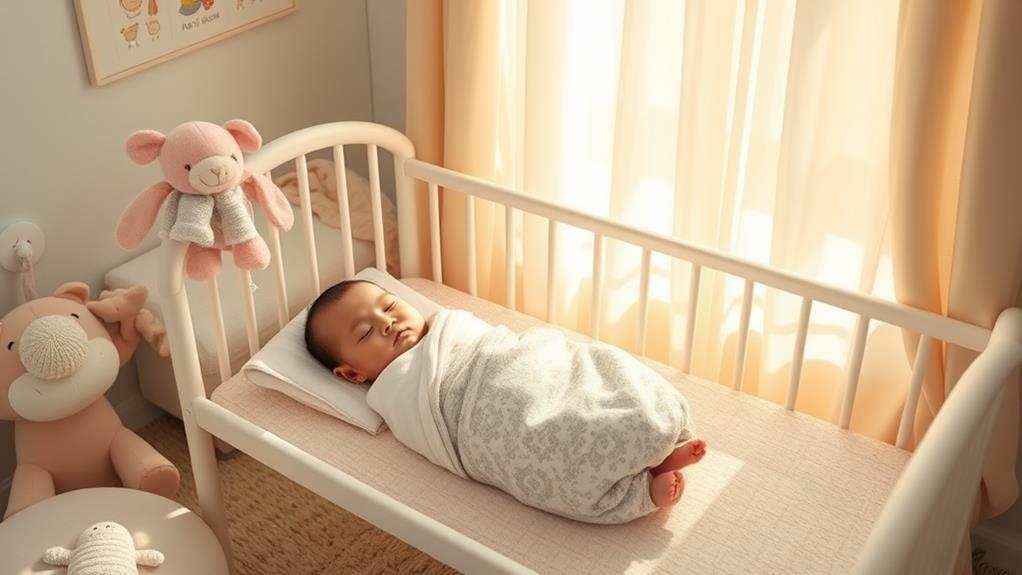
The joy of welcoming a newborn into your life is often accompanied by a whirlwind of emotions and new experiences. In the first month, you'll notice your baby is adapting to their new environment. They're primarily focused on sleeping, eating, and bonding with you.
Newborns usually sleep around 16 to 18 hours a day, but they wake frequently to feed. You might feel exhausted, but those nighttime feedings are crucial for your baby's growth.
During this time, your baby will also start to show signs of awareness. You might catch them looking at your face or following a moving object with their eyes. This is the beginning of their visual development, and it's exciting to witness!
Your little one's reflexes are quite strong too; they'll grasp your finger or startle at loud noises.
Don't forget to spend time talking, singing, or reading to your newborn. They mightn't understand the words, but the sound of your voice is comforting.
Each interaction helps them feel secure and loved. Embrace this precious time, as it lays the foundation for their emotional and social development in the months to come.
Month 2 Milestones
As your baby enters their second month, you'll notice significant changes in their development. This period is all about growth, and you'll likely see your little one starting to engage more with the world around them. By now, they may be able to lift their head while lying on their tummy, which is a big step towards developing those neck muscles. You might even catch them turning their head towards sounds, showing that they're becoming more aware of their environment.
Another exciting milestone is the emergence of social smiles. Your baby may start to smile in response to your face, making those interactions even more heartwarming. They're also beginning to recognize familiar voices, so don't be surprised if they seem more relaxed when you talk to them.
During this month, your baby's vision improves too. They can now focus on objects up to 18 inches away, so they might be captivated by bright colors and patterns. This is a great time to introduce interesting toys or books.
Month 3 Development
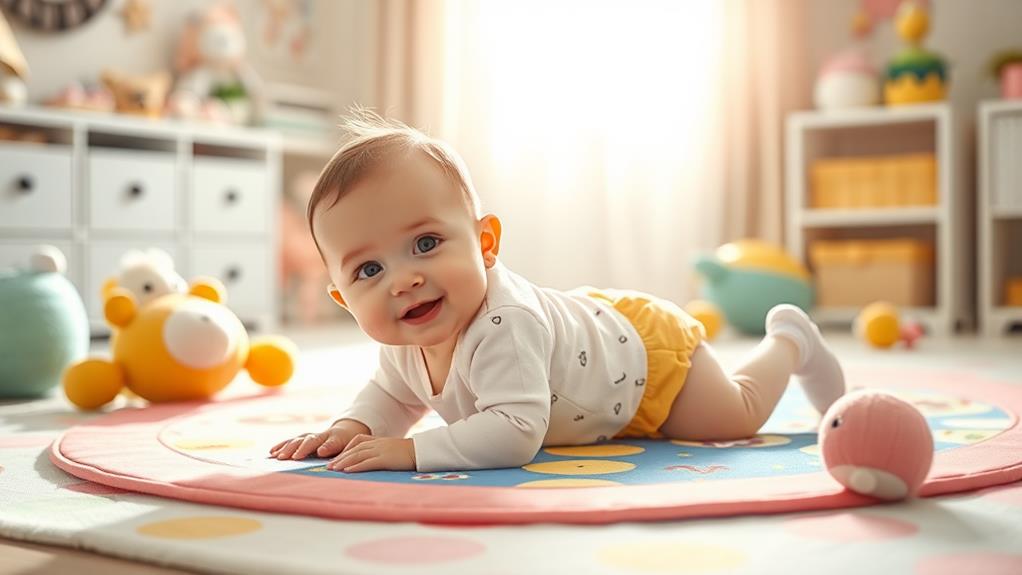
At three months old, your baby's personality really starts to shine. You might notice your little one becoming more expressive, showing excitement through coos and smiles. They're beginning to recognize familiar faces, and you may see them light up when they spot you. This is a great time for bonding, as they love interacting with you.
Physically, your baby's neck muscles are getting stronger, allowing them to hold their head up for longer periods. Tummy time is essential now, as it helps develop those muscles and builds coordination. You might even catch them pushing up on their arms, a sign that they're ready to explore more.
Socially, your baby's communication skills are blossoming. They'll babble, and you'll find it adorable! Responding to their sounds encourages this development, so don't hold back on chatting with them.
Cognitive skills are also advancing; they're starting to track moving objects with their eyes and show interest in toys. Offering colorful, safe toys can stimulate their curiosity and enhance their development.
Enjoy this exciting month, as your baby grows and learns in leaps and bounds!
Month 4 Growth Patterns
By four months, you'll notice your baby's growth patterns becoming more pronounced. This is an exciting time as your little one continues to develop at a remarkable pace! Typically, babies gain about 1 to 2 pounds this month, and they might grow around 1 to 1.5 inches in length. You might find that their head circumference increases as well, signaling healthy brain growth.
Around this age, your baby may start to exhibit a more established sleep pattern. While some babies still wake for nighttime feedings, many will sleep for longer stretches during the night. You might also notice that your baby is becoming more alert and engaged during wake times, showing interest in the world around them.
Another key aspect of growth is increased strength. Your baby might be able to push up on their arms while lying on their tummy, which is a sign of developing muscles. It's important to provide plenty of tummy time to support this growth.
Keep encouraging these physical milestones, and remember that every baby grows at their own pace. Enjoy this wonderful journey, as each day brings new surprises and milestones!
Month 5 Skills and Abilities
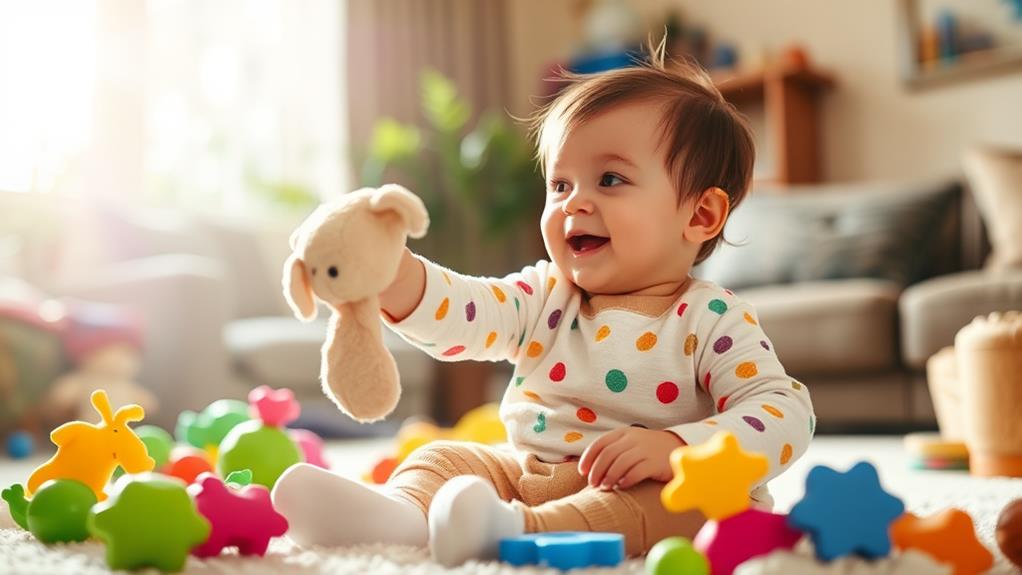
Month five is a thrilling period for your baby's skills and abilities, as they start to reach impressive milestones. You may notice that your little one is becoming more curious and engaged with their surroundings. They're likely to show interest in toys, reaching for them with both hands and trying to grasp objects. This exploration is essential for developing fine motor skills.
At this stage, your baby might also begin to roll over more frequently, which helps strengthen their core muscles. You might catch them practicing this skill during playtime, and it's a good idea to provide a safe space for them to experiment. As they roll, they'll discover new perspectives and might even start pushing up on their arms when lying on their tummy.
Another exciting development is their growing ability to communicate. You'll hear more cooing and babbling as your baby experiments with sounds. This vocal play is a precursor to speech and shows their desire to interact with you.
Encourage this by responding to their sounds, turning it into a fun back-and-forth conversation. Overall, month five is packed with growth, both physically and cognitively, so enjoy every moment of this exciting journey!
Month 6 Physical Changes
As your baby wraps up month five, you'll notice some exciting physical changes in month six.
Your little one is likely to become more mobile, starting to roll over with ease. This newfound ability opens up a whole new world for them, as they can explore their surroundings more independently.
You might also notice your baby pushing up on their hands during tummy time, strengthening those arm and back muscles.
Around this time, many babies begin showing signs of teething.
You may see swollen gums, and your baby might be more fussy than usual. Keep an eye out for drooling, as this is another common sign of those little teeth making their way in.
Month 7 Cognitive Progress
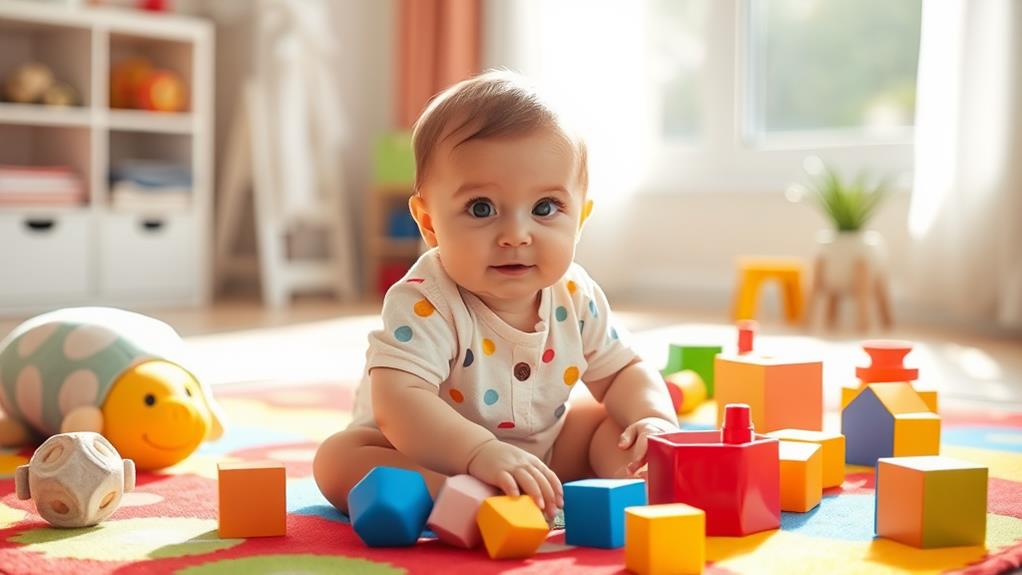
During month seven, you'll likely notice your baby's cognitive skills blossoming. At this stage, your little one becomes more curious about the world around them. They may start to explore objects with their hands and mouth, discovering different textures and shapes. You might see your baby reaching for toys, showing that they understand cause and effect. When they drop a toy and watch it fall, they're experimenting with their environment.
Language development also begins to flourish. Your baby might babble more, combining sounds in new ways, and you may hear a few distinct consonant sounds emerge. Responding to their babbling encourages them to keep practicing their vocal skills.
Reading to your baby becomes even more important now, as they start recognizing familiar words and sounds.
Moreover, your baby's memory improves, allowing them to remember faces and things they see regularly. They may show signs of recognizing family members and friends, smiling or reaching out to them.
As you engage with your baby, be sure to provide plenty of opportunities for exploration. These cognitive advances are essential for their overall development, laying the groundwork for future learning!
Month 8 Emotional Growth
By the time your baby reaches eight months, you'll notice significant emotional growth alongside their cognitive advancements. At this age, your little one is starting to develop a sense of attachment, which is evident when they show preferences for familiar faces. You might find that they smile or giggle more at you and other loved ones, showcasing their growing social skills.
During this month, your baby may also exhibit a range of emotions, from joy to frustration. When they can't reach a toy, you might see their face scrunch up in a frown or hear them let out a little squeal. This is an important part of their emotional development, as they learn to express feelings.
They might also start showing separation anxiety, especially when you leave the room. This is completely normal and a sign that they're forming strong attachments.
Encourage this emotional growth by responding warmly to their cues. When your baby smiles, return that smile! Engage in playful interactions, like peek-a-boo, to foster a sense of security and trust.
Your support during this emotional phase will help them build a solid foundation for future social interactions.
Month 9 Preparing for Toddlerhood
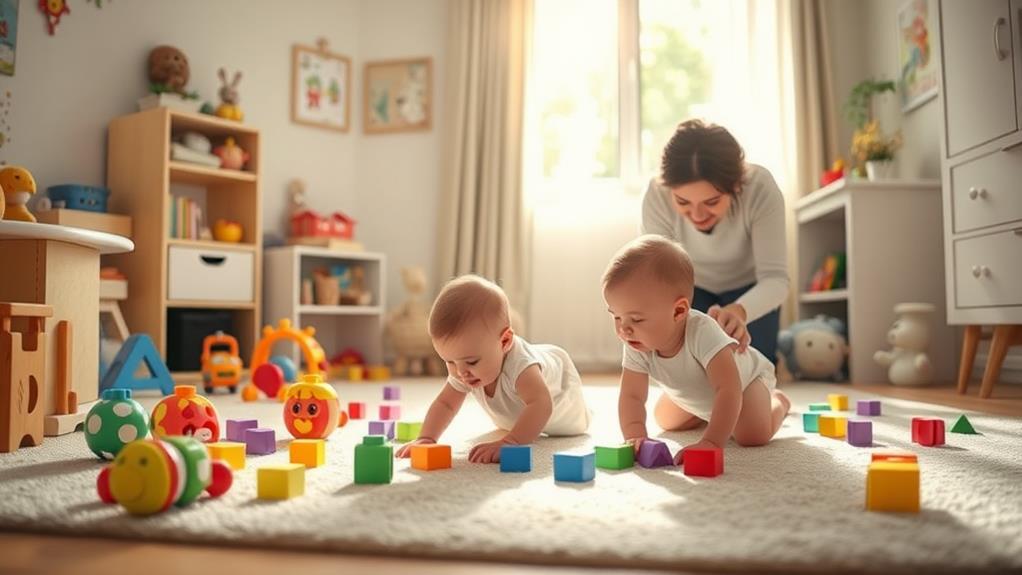
At nine months, your baby is often on the brink of toddlerhood, showcasing newfound independence and curiosity. You might notice them pulling themselves up to stand, crawling with purpose, or even trying to take those first wobbly steps. These milestones signal a desire to explore their environment, and it's important to encourage this budding independence while ensuring their safety.
As your little one grows, start introducing simple choices like picking between two toys or snacks. This helps them feel empowered and builds decision-making skills. Create a safe space for exploration by baby-proofing your home, removing sharp objects, and securing heavy furniture.
Don't forget to engage them with interactive play—think stacking toys or shape sorters. These activities not only entertain but also enhance fine motor skills.
Social interactions are also essential now. Arrange playdates or attend baby classes to encourage sharing and communication. Keep reading to them, as this fosters language development and strengthens your bond.
Celebrate their achievements, no matter how small, and remember, each day brings new opportunities for growth and learning. Embrace this exciting transition and enjoy every moment as your baby prepares to become a toddler!
